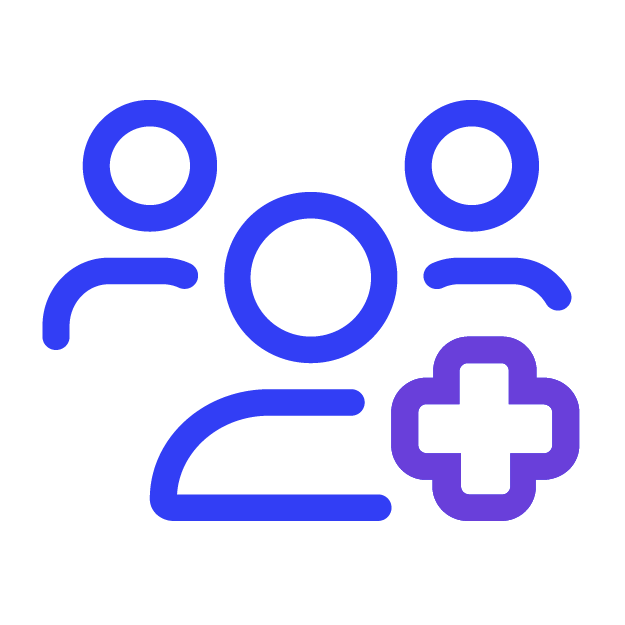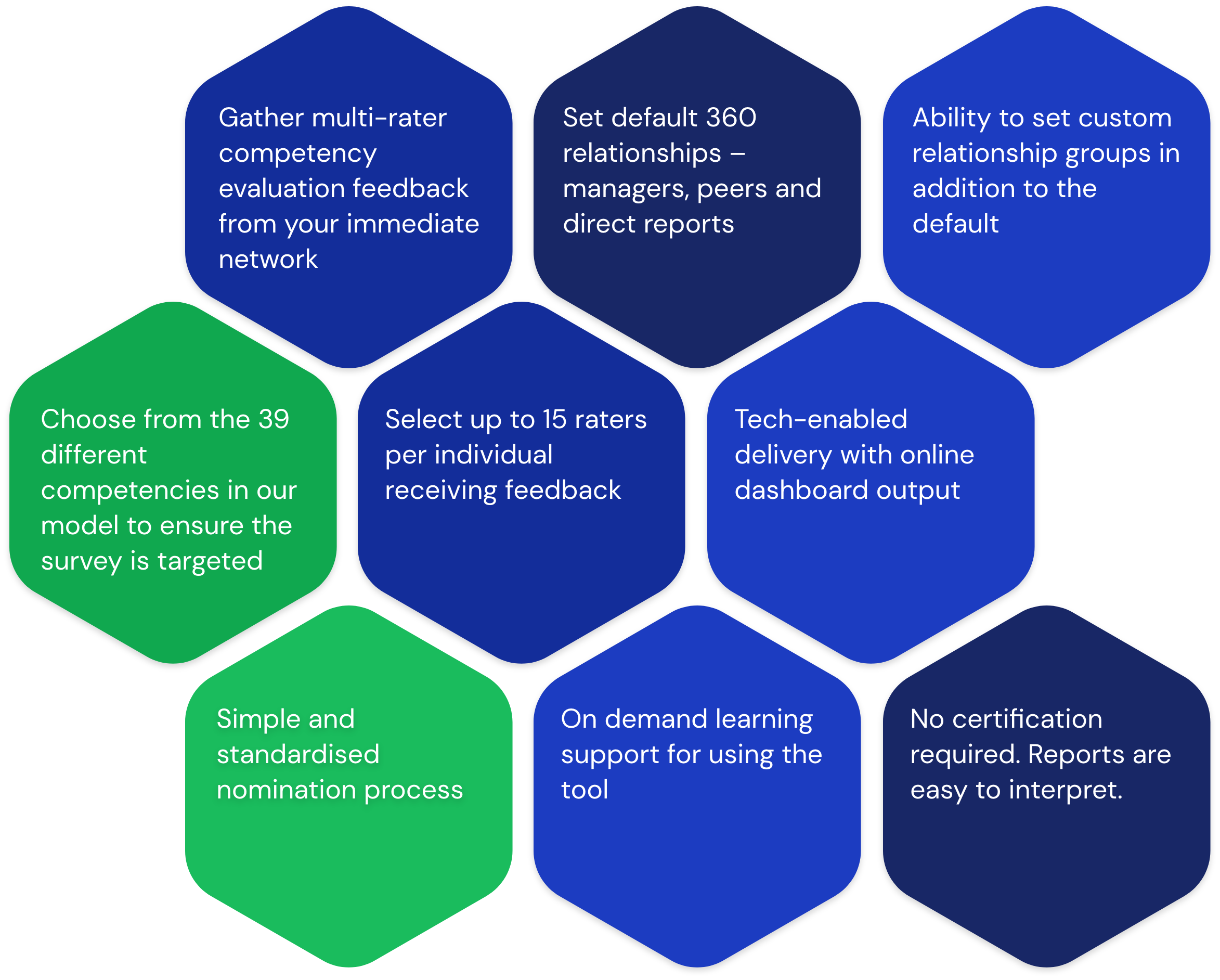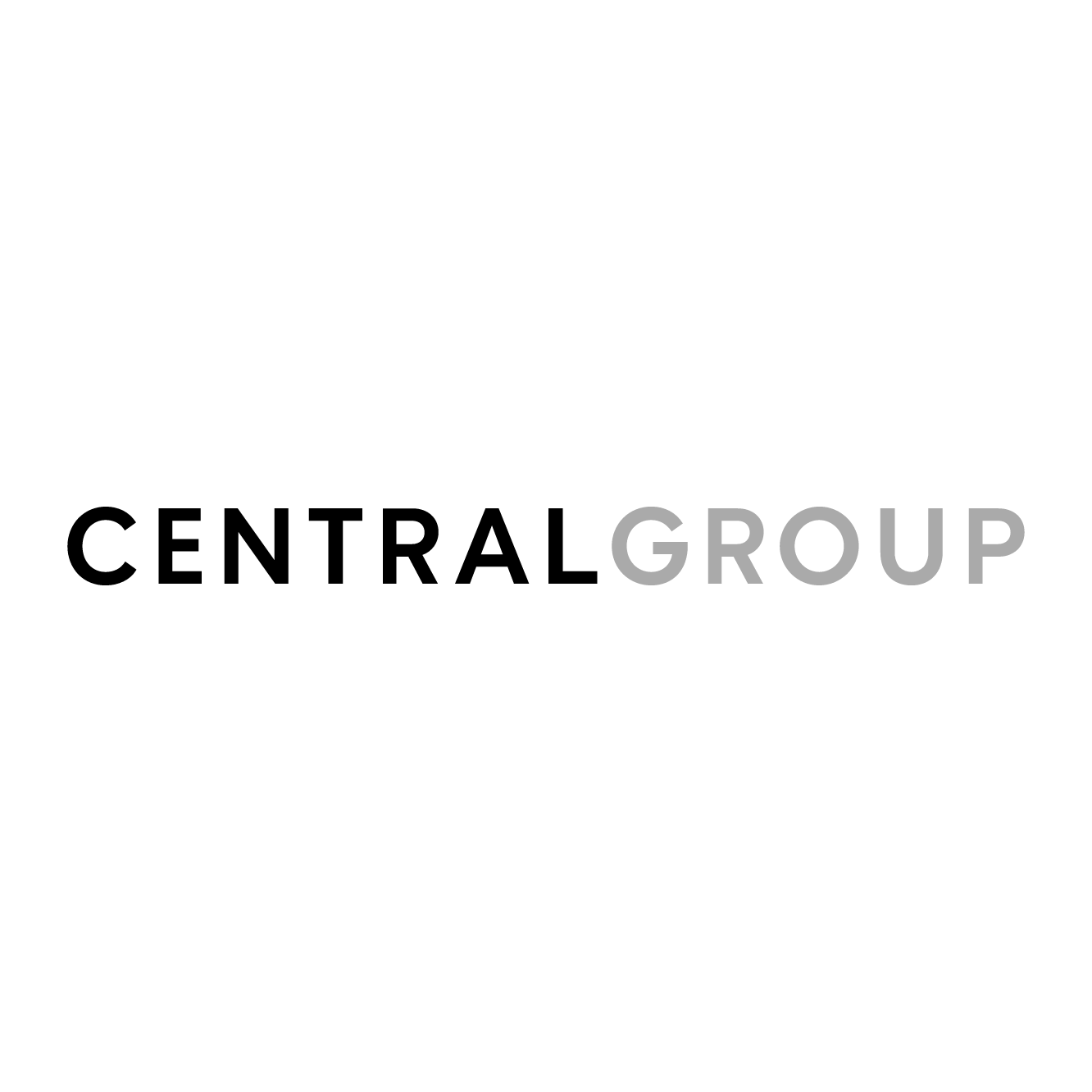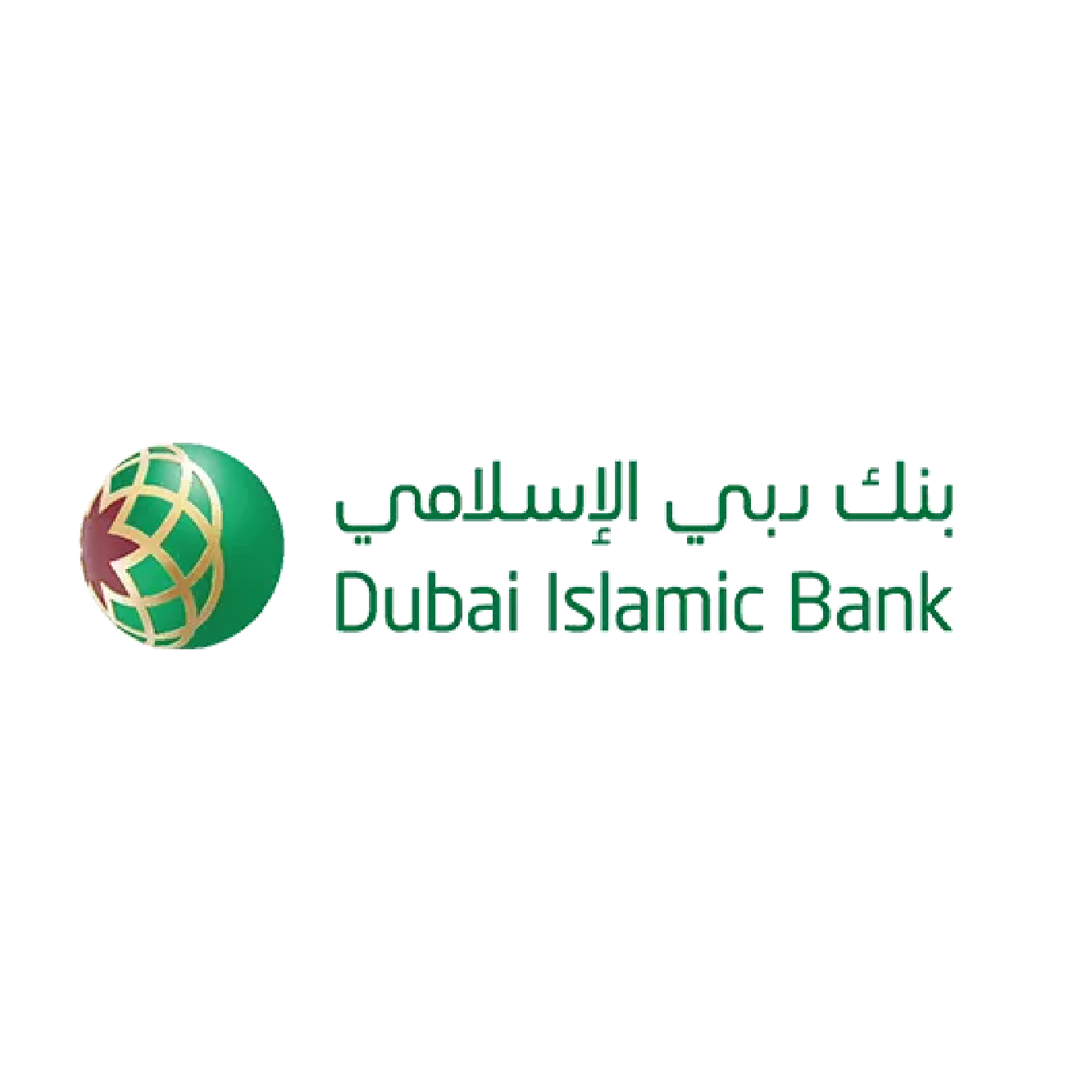CompetencyNavigator
Competency models identify the knowledge, skills, abilities, and other characteristics (KSAOs) required for effective performance in a particular job. They can improve organizational effectiveness by providing clear expectations for employees, supporting better recruitment and selection, improving performance management, providing guidance for career development, and supporting succession planning.
We offer two decades’ of experience in implementing competencies to accelerate performance.
Thank you for your interest in exploring Mentis 360
Focused feedback promotes
personal & professional growth

Self
Conducting a self-competency evaluation provides an opportunity for you to reflect on your strengths and identify areas where you need to improve. However, comparing your self-evaluation to an external competency evaluation can help you identify blind spots and uncover hidden strengths that may not have been apparent to you. By combining both self-reflection and external feedback, you can gain a more comprehensive understanding of your competencies and take targeted steps to further develop and maximize your potential.

Self + Manager
In the process of personal development, after the individual themselves, the manager has the second-largest influence on their success. Receiving 180° feedback from your manager actively involves them in your development, providing valuable and constructive insight, and engaging them to support and participate in your journey. By involving your manager in your competency evaluation, you can gain a more comprehensive understanding of your strengths and areas for improvement and work together to set goals and develop strategies for improvement.

Multi-source
360° feedback, or multi-rater feedback, involves gathering competency evaluations from an individual’s immediate network, including peers, direct reports, colleagues, and external contributors. This feedback complements self-evaluation and manager evaluation, providing a comprehensive understanding of an individual’s strengths and areas for improvement. It helps individuals become more self-aware and identify specific habits or behaviors to address for ongoing personal and professional development.
Why is it important to align feedback with competencies?
1
A well-designed competency model gives specific and measurable indicators to focus attention
2
Structured feedback across the important areas of performance will be more comprehensive
3
Feedback linked to competencies allows for the concept of personal growth within target areas
4
Enables feedback and development options to be grouped logically and conveniently
5
The Mentis framework is designed to make comparisons between groups of colleagues and across an organization


Good practices in competency feedback
Making sure the focus is on development & progression


Tracking Progress
Effective feedback should be an ongoing process rather than a one-time event. Regular feedback provided over consistent time periods allows colleagues to make achievable progress, celebrating small milestones that provide confidence boosts and ultimately building towards more significant, sustainable, long-term change and success. By embracing a continuous feedback cycle, individuals can develop their competencies in a positive and consistent way, enabling them to reach their full potential and achieve both personal and organizational goals.


Transparency
To ensure a successful competency evaluation process, it’s essential to provide a clear understanding of the competencies being evaluated and the reasons for their importance. Involving individuals in the competency discussion and seeking their input from the outset can lead to greater engagement and commitment to the development opportunity. By making two-way communication the foundation of the process, individuals are more likely to succeed and achieve their goals. This approach not only fosters a culture of transparency and trust, but also empowers individuals to take ownership of their development and actively participate in their journey towards personal and professional growth.


Build Trust
When starting feedback journeys for the first time, it’s important to build the process gradually instead of jumping straight in. This approach can help avoid triggering fear, worry, or defensiveness among participants. Begin by incorporating self-evaluation, then move to manager-evaluation before implementing a full 360° process. This gradual approach can help establish a constructive and safe momentum for the feedback journey. Often the process of understanding the content of multi-source feedback is improved by a coaching relationship – Mentis can provide experienced an supportive consultants for this purpose.
Interested in how Mentis 360° feedback is used for team development?
Thank you for your interest in exploring Mentis 360
Benefits of Mentis Competency Navigator
Mentis Competency-based feedback provides structured feedback from your immediate network to gain valuable insights into key strengths and development opportunities based on our Mentis High Performance Competency Model.

Our solutions are designed to be user friendly and affordable
Thank you for your interest in exploring Mentis 360
Hear From Our Clients
“We will definitely make use of this as a tool for coaching, for career discussion and also for selection of senior executives”

EVP-HR Head of Corporate Learning Development, Central Group
Akarin Phureesitr
“We worked with Mentis during our Leadership Development program and found them to be extremely professional and helpful in giving us deep, valuable and data driven insights on the developmental areas of our Leadership cohort which helped to target strategic developmental programs in a cost effective manner to achieve some fantastic ROI.”

Head of Performance and Rewards, Dubai Islamic Bank
Joseph Mendes
Frequently Asked Questions
Didn’t find your answer here? Just send us a message and we’ll help in no time.
It measures observable behaviors, usually based on behavioral competencies (it can be your existing competency framework or Mentis will also be able to suggest from Mentis High Performance Competency Model). It will be able to show hidden strengths, the areas which the individual himself/herself did not realize but the others can observe, and improvement areas for development.
Approximately 15 – 20 minutes max. The number of questions are based on the number of competencies you would like to measure (each competency has 4 statements for evaluation). Typically each commentator will require half this time to write responses to open-ended questions.
The Mentis High Performance Competency Model includes three meta-competencies: Self, People and Organization. We recommend that for each job role or level of job role an expert judgment is made about the competencies to be surveyed. This can be one expert or a group depending on how critical the project is. We suggest experts consider how the job role may change in the next 1-2 years to ensure the survey is future-proofed.
In addition we recommend that between 8-16 competencies are selected across all 3 meta-competencies (Self, People and Organization). The more senior the position, the more higher-level competencies are likely to be included; however senior colleagues also require both Self and People competencies.
There are 4 statements to be evaluated for every competency.
The scale used runs from 1-6 based on the following choices:
Almost never
Rarely
Sometimes
Often
Most of the Time
Almost Always
We recommend 1-2 weeks to set-up the design including choice of competencies. Deciding who will provide feedback as commentators can be a rapid process or require 1-2 weeks. Administration takes typically 1 day. We advise to allow at least 2 weeks for commentators to complete their survey. The Mentis platform enables automatic emails for progress chasing.
Obviously self assessment relies on only the Focus Participant and can provide powerful insights particularly when the person is willing to explore strengths and weaknesses.
Similarly for 180° feedback the choice of commentators is typically self (Focus Participant) plus their immediate supervisor or line manager.
For multi-source feedback the aim is to invite a representative network of colleagues who have enough experience to comment on the Focus Participant’s competencies. We recommend a target group of between 8-12 commentators. It is important to ensure that the anonymity of commentators is ensured. Commentators can be peers, line managers, direct reports or others. We strongly recommend that a minimum of 3 commentators are included in each group.
This decision is guided by a number of factors such as company climate and the purpose of the feedback. If the feedback is purely for personal development you may wish to encourage Focus Participants to make their own choices – often they may choose people who are politely to give positive feedback.
For developmental programs which are intended to support succession planning or career management most employers will either:
a. ask the Focus Participant to recommend the commentator nominations and then verify these. or,
b. select commentators without involving the Focus Participant.
No – we follow the accepted practice which is to average all commentators’ evaluations. However, the report can show the average for each category of commentators (direct report, peer, line manager, etc.).
We use this term to refer to the person who is the target of the feedback and the intended recipient.
The report can be viewed online or in PDF format.
Sample here: https://mentis-assessments.com/index.php/f360/module/index/sid/784596/token/LZmMlt4nCPLtFTh
This can be saved as PDF by clicking the print button on the top right corner.
The reports can be “whitelabelled” with client’s requested theme colour and logo.
Yes – subject to a fee quotation if a significant amount of configuration is required – Mentis can set-up different sets of competencies for different job roles or levels of role.
At the end of the survey there are a number of questions which are open-ended. These allow commentators to provide their own responses if they wish to. Our customers find this feedback very helpful as it provides more context to explore.
Typically we recommend the following questions:
- What are the main strengths of the individual and what should they keep doing?
- What is the individual’s greatest opportunity for development and what can they do to improve?


